Sorbus 'Gibbsii' is a cultivar of the rowan genus Sorbus . It is a tree with white flowers and small, bright red, round or oval berry-like fruits that are really pomes. It is an important food source for birds and other wildlife. It is also popular as an ornamental plant. It is also used as a street tree.
Sorb may refer to:

The rowans or mountain-ashes are shrubs or trees in the genus Sorbus of the rose family, Rosaceae. They are native throughout the cool temperate regions of the Northern Hemisphere, with the highest species diversity in the Himalaya, southern Tibet and parts of western China, where numerous apomictic microspecies occur. The name rowan was originally applied to the species Sorbus aucuparia and is also used for other species in the genus Sorbus.
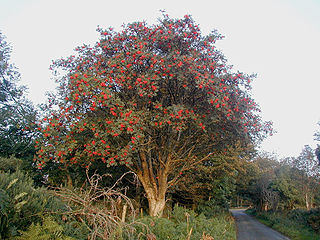
Sorbus aucuparia, commonly called rowan and mountain-ash, is a species of deciduous tree or shrub in the rose family. It is a highly variable species, and botanists have used different definitions of the species to include or exclude trees native to certain areas. A recent definition includes trees native to most of Europe and parts of Asia, as well as northern Africa. The range extends from Madeira, the British Isles and Iceland to Russia and northern China. Unlike many plants with similar distributions, it is not native to Japan.

Sorbus is a genus of over 100 species of trees and shrubs in the rose family, Rosaceae. Species of Sorbus (s.l.) are commonly known as whitebeam, rowan, mountain-ash and service tree. The exact number of species is disputed depending on the circumscription of the genus, and also due to the number of apomictic microspecies, which some treat as distinct species, but others group in a smaller number of variable species. Recent treatments classify Sorbus in a narrower sense to include only the pinnate leaved species of subgenus Sorbus, raising several of the other subgenera to generic rank.

Cormus domestica, commonly known as service tree or sorb tree, is a species of tree native to western, central and southern Europe, northwest Africa, and southwest Asia. It may be called true service tree, to distinguish it from wild service tree. It is the only species in the monotypic genus Cormus.
Service tree can refer to:
The Arran whitebeams are species of whitebeam endemic to the island of Arran, Ayrshire, Scotland.

Horseshoe Bend, Shirehampton is an 11 acre biological Site of Special Scientific Interest in Bristol, England, on the north bank of a lower, tidal stretch of the River Avon, 1.9 miles downstream from the Avon Gorge, and just east of Shirehampton. It was notified as an SSSI in 1999.

The tree species Sorbus americana is commonly known as the American mountain-ash. It is a deciduous perennial tree, native to eastern North America.
Hedlundia pseudomeinichii, known as false rowan and Catacol whitebeam, is a rare species of tree endemic to the Isle of Arran in south-western Scotland. It is believed to have arisen as a hybrid of the native European rowan and the cut-leaved whitebeam which is in turn a rowan/Arran whitebeam hybrid. Until 2020, only one living specimens of the Catacol whitebeam was known, at the time making it the rarest tree not only in Scotland, but joint rarest in the world with Wood's cycad. Another was recorded as a sapling, but is believed to have been destroyed by deer. A seedling and grafted plants have also been grown in Edinburgh.
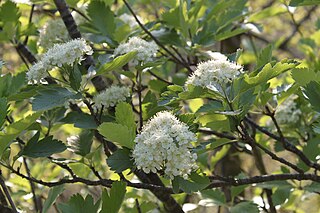
Sorbus leyana. Ley's whitebeam is a species of small tree which is endemic to two sites in southern Wales. It is thought to have arisen by hybridisation of two species of Sorbus, one of which was the rowan. Its closest relatives are some of the other hybrid derived Sorbus species found in Britain.
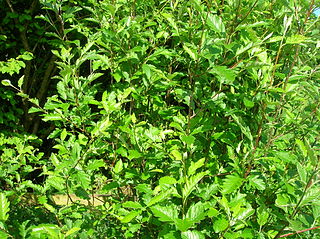
Hedlundia pseudofennica, also called Arran service-tree or Arran cut-leaved whitebeam, is a species of plant in the family Rosaceae. Endemic to the Isle of Arran in Scotland, it is threatened by habitat loss. It is thought to be a naturally occurring hybrid between H. arranensis and Sorbus aucuparia, probably with additional backcrossing with S. aucuparia. Hedlundia arranensis is itself a hybrid between Aria rupicola and S. aucuparia. Apomixis and hybridization are common in some groups of Sorbus species.

Aria edulis, the whitebeam or common whitebeam, is a species of deciduous tree in the family Rosaceae. It is native to most of Europe as well as North Africa and temperate Asia. Typically compact and domed, with few upswept branches and almost-white underside of the leaves, it generally favours dry limestone and chalk soils. The hermaphrodite cream-white flowers appear in May, are insect pollinated, and go on to produce scarlet berries, which are often eaten by birds.
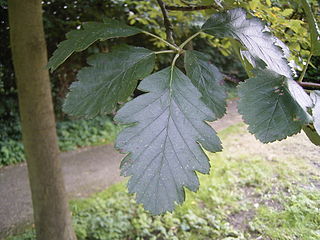
Scandosorbus intermedia or, formerly, Sorbus intermedia, the Swedish whitebeam, is a species of whitebeam found in southern Sweden, with scattered occurrences in Estonia, Latvia, easternmost Denmark (Bornholm), the far southwest of Finland, and northern Poland.

Hedlundia hybrida, the Swedish service-treeFinnish whitebeam, or oakleaf mountain ash, is a species of whitebeam native to Norway, eastern Sweden, south-western Finland, and locally in Latvia.
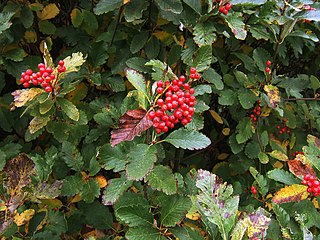
Sorbus mougeotii, the Vosges whitebeam or Mougeot's whitebeam, is a species of whitebeam native to the mountains of central and western Europe from the Pyrenees east through the Alps to Austria, and north to the Vosges Mountains.

Sorbus vilmorinii, the Vilmorin's rowan or Vilmorin's mountain ash, is a species of flowering plant in the family Rosaceae, native to Sichuan, Tibet and Yunnan in China.

Karpatiosorbus admonitor, previously classified as Sorbus admonitor and also called the no parking whitebeam, is a species of whitebeam tree found in Devon, United Kingdom. It is known only from the Watersmeet Valley at Lynton, with two stray plants growing on the coast above Sillery Sands, Countisbury.

Malinae is the name for the apple subtribe in the rose family, Rosaceae. This name is required by the International Code of Nomenclature for algae, fungi, and plants, which came into force in 2011 for any group at the subtribe rank that includes the genus Malus but not either of the genera Rosa or Amygdalus. The group includes a number of plants bearing commercially important fruits, such as apples and pears, while others are cultivated as ornamentals.